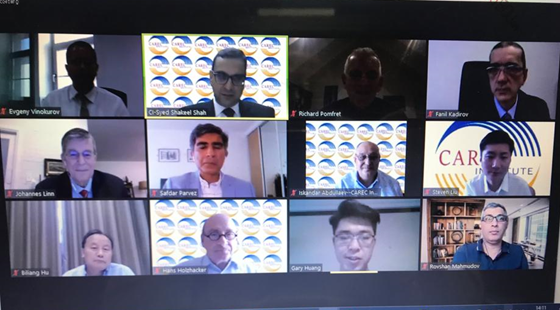President ECOSF Participated in Webinar on Prospects for Economic Integration on the Euro-Asian Continent and Its Implications for CAREC
Go Back

The CAREC Institute in partnership with the Asian Development Bank (ADB) held a webinar on the prospects of integration and cooperation processes on the Euro-Asian continent and the implications for CAREC on 22 June 2021. On behalf of ECOSF, the President Prof. Dr Manzoor Hussain Soomro participated in the event.
Distinguished speakers and panelists (both from within the CAREC region, as well as from major neighbors, including the People’s Republic of China, India, Russia) provided policymakers and the broader concerned public with a spectrum of views and ideas about opportunities, obstacles, and desirable policies and measures related to the topic.

Dr. Johannes Linn (Brookings Institution, former World Bank Vice President) set the stage by providing an overview of the world order, economic and political clustering since 1955, major disruptive events that happened over time, and realignments that took us to today’s world order. He noted lessons from the experience of the Ancient Silk Road that carry over to today and stressed that institutional and political factors will be crucial in determining whether and how Euro-Asian economic integration progresses.
Dr. Evgeny Vinokurov (Chief Economist at the Eurasian Development Bank and the Eurasian Fund for Stabilization and Development) highlighted energy, water, digital connectivity, and labour migration as particularly important areas for cooperation. He mentioned that Eurasian integration can produce tangible results for the continent if the approach is pragmatic, focuses on doable things, and addresses the issue of significant trust deficit. “Trust can be called talking clubs,” Dr. Vinokurov said. He described the Belt and Road Initiative (BRI) as very influential as it set in motion many other initiatives by other regional and world players. He further elaborated on-premises set out in his book titled “One Eurasia or Many?”
Mr. Ishrat Hussain (Adviser to the Prime Minister of Pakistan for Institutional Reforms and Austerity) briefed the audience about the reform of the regulations that the Pakistani government is undertaking, mentioned Pakistan’s national single window project which will unite 26 governmental agencies for client convenience. He also mentioned the China-Pakistan Economic Corridor (CPEC) and appreciated its customized approach. He highlighted that the debt trap is a myth and while external shocks typically trigger the financial crisis, the impact on individual economies is heavily influenced by domestic policy frameworks and choices.
Both Mr. Fanil Kadirov (Head of the Department for Economic Research of the International Institute of Central Asia, Uzbekistan) and Prof. Biliang Hu (Professor and Executive Dean at the Belt and Road School, Beijing Normal University) echoed each other that over time interaction and cooperation is improving on the Euro-Asian continent. If 10 years ago, it was very difficult to find a linkage, now there are numerous mutually beneficial projects and complementary activities taking place.
Mr. Safdar Parvez (Director, Regional Cooperation and Operations Coordination Division, Central and West Asia Department, ADB) concluded the event by highlighting that ADB will continue to support the CAREC program by trying to maintain the momentum in implementing physical infrastructure projects together with the soft projects, also will look into areas where efforts need to be enhanced, such as the water-energy nexus, economic corridor development, and human capital development. He emphasized that ADB sees the CAREC program as an open and inclusive platform for multilateral and bilateral development partners.